Ron Cousins: The Bible pages murder still baffling police
- Published
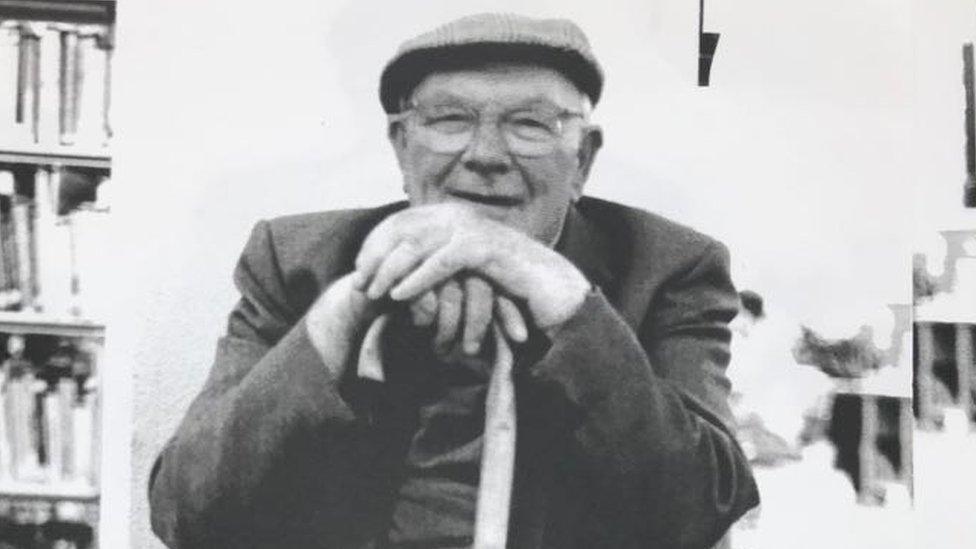
Ron Cousins was killed in the house he had lived in his whole life
The body of 78-year-old Ron Cousins was found splattered in white paint - and stuffed in his mouth were pages of his own Bible. The devout Christian and popular member of the community had been throttled and stabbed in his own home. Nearly a quarter of a century on from the murder, police are still struggling to find his killer.
Early on a spring morning in April 1994, water could be heard splashing out of an overflow pipe at the back of one of the narrow terraced houses in the old Moulsham area of Chelmsford.
The neighbours weren't sure whether to disturb the home's owner, an elderly gentleman known to many in the town for his kind, friendly nature.
But the running water - and the fact his curtains were still drawn - was a strange enough sign for them to check in on him.
The back door was open, so Paul and Phyllis Nestor walked in.
They were met with a house that had been wrecked - rooms had been overturned, and the bath was overflowing from a still-running tap.
In the living room, a body lay on the floor covered in paint. A red-raw ligature mark could be seen around the man's neck and there were stab wounds to his back, neck and chest.
A kitchen knife - oddly, not the murder weapon - rested on his torso. Leaves torn from the Bible were shoved in his mouth. But £700 in cash, apparently hidden in the oven, remained untouched.
The question has baffled police for 25 years: Why would anyone want to kill Ron Cousins - a man who had been committed to God and welcoming to all?
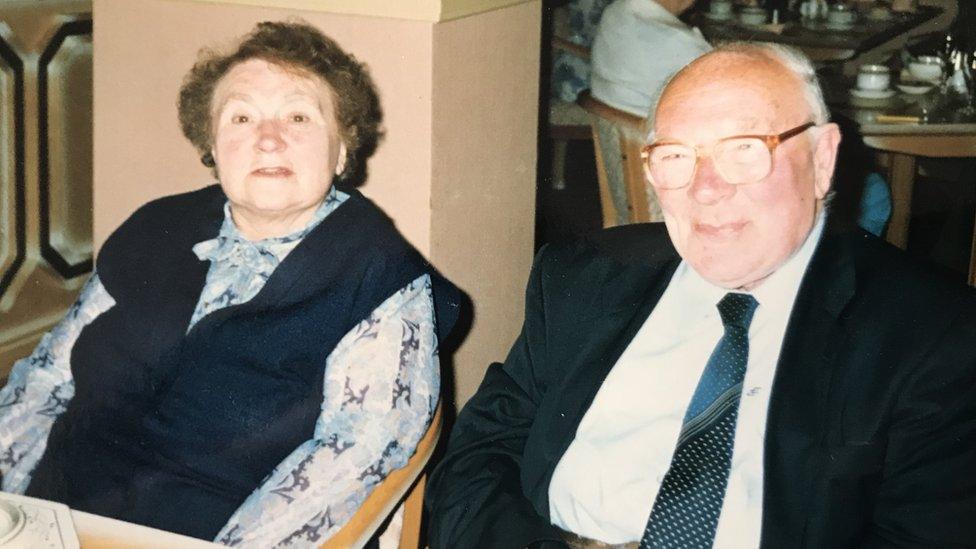
Ron Cousins, pictured with his sister Ruby, had lived in Chelmsford all his life
"I used to go and see him and he'd have all sorts of strangers in," recalled his nephew, David Ketley.
"I'd tell my mother and say, 'Ron's got some people round there and I don't know who they are. He's got to be careful because one day something might happen to him'."
The former milkman had spent almost his whole life in the quiet market town of Chelmsford - born in the same two-up, two-down he died in.
It was there he frequently put a temporary roof over the heads of vagrants and the homeless.
Ken and Jacqui Powell had worked with Ron in younger years, during his time at the Crompton Parkinson electrical factory.
"He came to our wedding, and later he was our son's godfather. He used to take the boys when they were small. He was a very friendly man," said Mrs Powell.
"He just knew everyone. I think he was probably one of the most well-known people in Chelmsford."
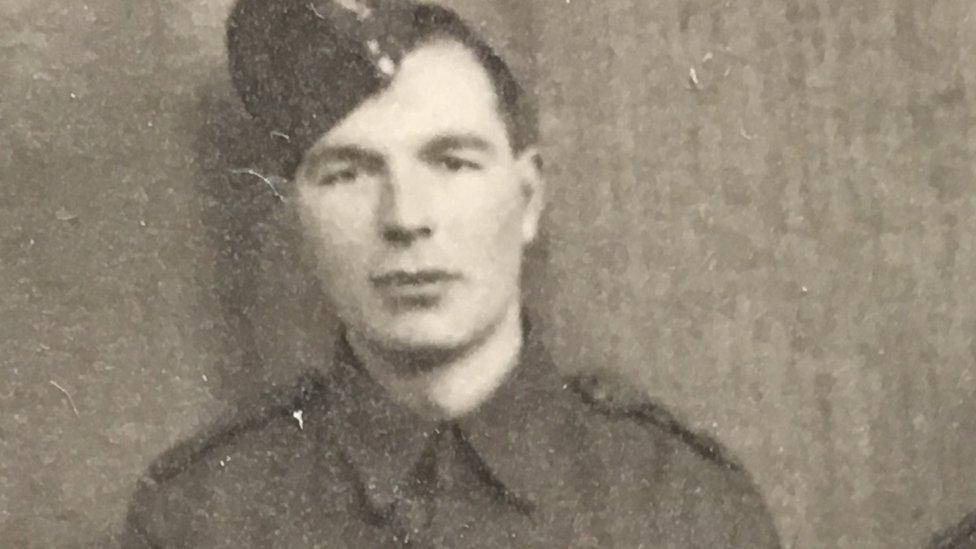
During World War Two, Ron was a medic in India
Apart from his time in India during World War Two, Ron never moved out of Anchor Street, where had grown up with three siblings, who eventually moved to have families of their own.
Religion had always played a big part in his life, from early days at Sunday school to his regular visits to Christchurch United Reformed Church, Elim Church and the Salvation Army.
When their mother died, he lived alone, and sought solace from friends at various churches.
Journalist Amanda Stocks said Ron's death profoundly shook the town.
"I think everybody was very shocked at the time. We put it on the front page of both the Weekly News and the Evening Gazette.
"[Chelmsford] was a very sort of carefree, safe place - it probably changed the way that we went about our daily lives.
"I've been in this industry 28 years and this one sticks in my mind the most, because it was so bizarre and so shocking."

The Anchor Street house where Ron lived almost his whole life
In the weeks after the murder, Essex Police spoke to hundreds of people.
"We looked at where the paint came from - was it in his home already? Was there significance behind that, like was the person a painter or decorator?" said Det Insp Stuart Truss.
"The Bible pages also play a significant part in our investigation - but I can't go into detail about what they contained."
The detective confirmed the force still has the pages, but refused to reveal any details whatsoever about the text they contained "for operational reasons".
A neighbour, who wished to remain anonymous, told the BBC he had seen the paint in Ron's house previously.
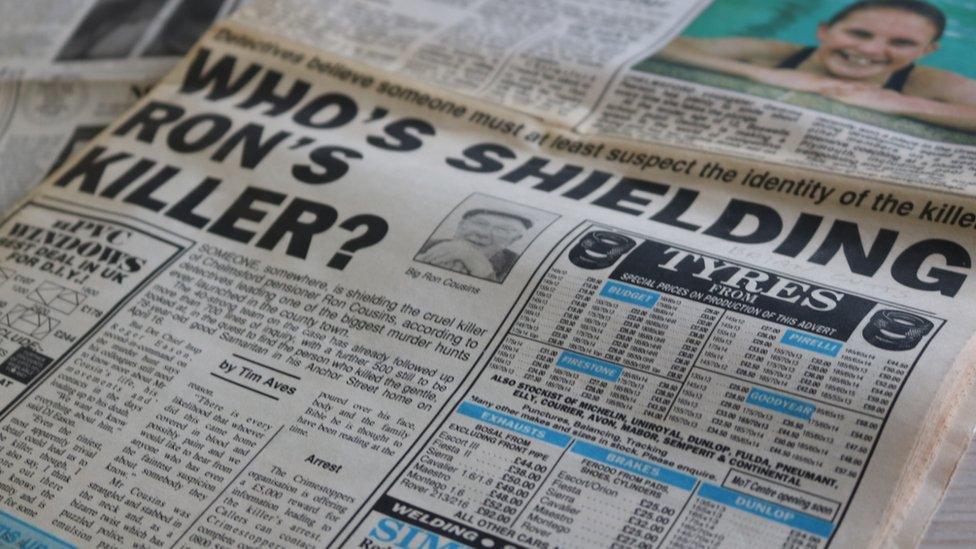
Local newspapers were filled with coverage of the brutal murder

Det Insp Stuart Truss is leading the cold case team investigating the murder of Ron Cousins
Investigating Ron's murder was made more difficult by the "relatively lonely existence" he had led, the detective said.
But he was nevertheless well-known, and his tendency to open his home to strangers meant there would have been "quite a large pool of potential suspects", according to Birmingham City University professor, Elizabeth Yardley.
"Many people will talk about psychopaths when we talk about this kind of murder," said the criminologist.
"Looking at the murder itself, there was an awful lot more violence and abuse than was needed to end the victim's life.
"This was somebody who didn't just want to kill Ron; they wanted to utterly destroy him."

You might also be interested in

Police spoke to everyone whose fingerprints had been identified in the house.
The day after the body was found, officers questioned two people - a 16-year-old boy and a 32-year-old man.
Neither were charged with the murder, but the latter was convicted of burgling Ron six weeks before he was killed.
Later that year, a Crimewatch appeal with a detailed reconstruction of the day of the murder prompted more than 40 calls, and a £5,000 reward for information was put up.
But by April 1996, two years on from Ron's death, there was just one officer working on the case.
Three further arrests were made in 2005, but all the suspects were released without charge.
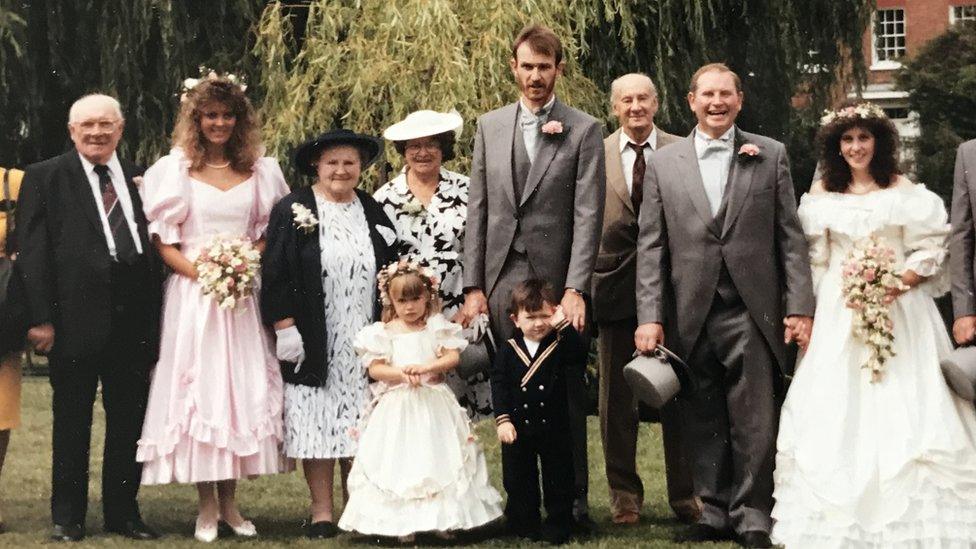
Ron, pictured far left, attended the wedding of his nephew David Ketley and bride Wendy in 1990
Despite the lack of police progress, the pensioner's relatives, colleagues and friends have never given up hope of a breakthrough.
David's wife, Wendy Ketley, said she has at times been "quite excited" about advancements in DNA testing, believing new technology could finally provide the family with closure.
Given that Essex Police still has the evidence recovered from Ron's house, potential new links to suspects could still be found, said Dr Denise Syndercombe Court.
"Twenty-four years ago, you would have to have a bloodstain that you can see quite easily," said the professor in forensic genetics at Kings College.
"Now we can analyse a handful of cells that you couldn't see even under a microscope [back then]."
The professor said in Ron's case, the Bible pages stuffed into his mouth could prove to have the DNA on them of whoever killed him.
"They might not have left any blood; they might not have been injured themselves.
"So typically you're looking for things that they might have handled, things they might have touched."
But, she said, detectives might struggle to match the DNA to whoever might have committed the crime unless they were on the national database.
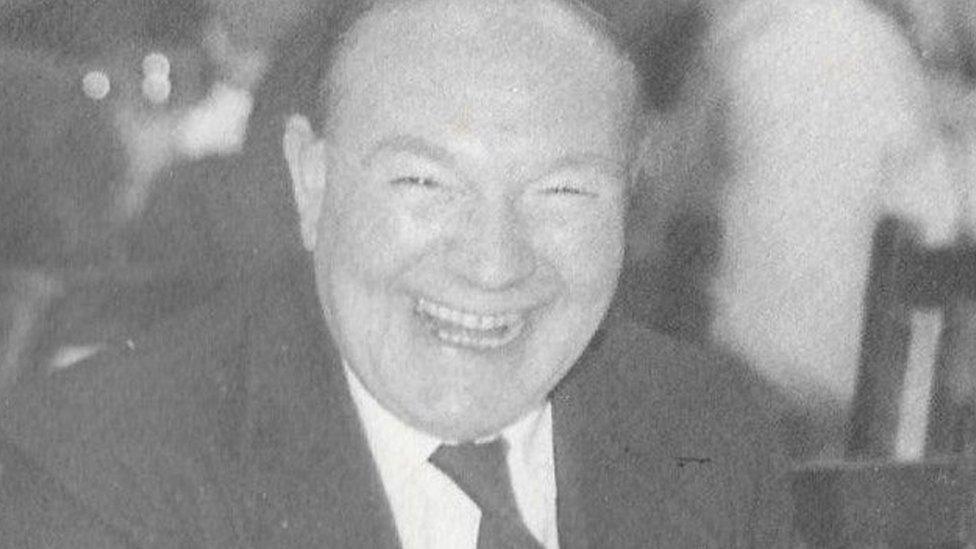
Ron, pictured at a friend's wedding in 1965, was described as "a lovely old boy"
Essex Police said its cold case team still regularly reviews the investigation - the force sent evidence for DNA testing using new methods as recently as November.
The cold case team says it has now received the results but they generated no new leads.
Det Insp Truss said there are a number of people who have not been ruled out of the investigation, but would not be drawn on names.
However, a teacher at Chelmsford Prison remembers one such name being put forward by an inmate during a discussion about the effect of crime on victims and their families.
"I mentioned the case of Ron Cousins," recalls the teacher, who does not wish to be named.
"That's what caused the outburst of this chap who said, 'I know who did it' and said the name Brian Cutts."
The BBC understands Mr Cutts, who was a former inmate and has now died, remains a suspect.
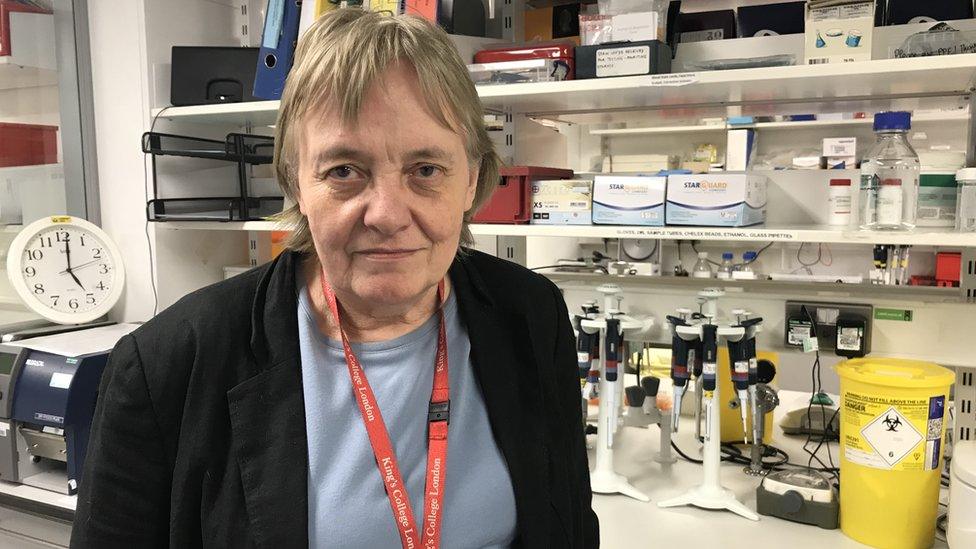
Dr Denise Syndercombe Court said there had been huge advances in DNA technology since 1994
But there are other ends yet to be tied up.
The force would not say whether any link has ever been found between Ron's murder and an attack in nearby Tolleshunt D'Arcy, in which canon Eric Turner, 82, was kicked, gagged and tied up in an attempted robbery five days after the killing.
Police said they "could not see anything that links the clergyman attack to the Ronald Cousins case".
The Crimewatch appeal honed in on a man seen by witnesses outside Ron's front door on the day of the murder.
A passer-by recalled seeing a figure with "longish hair and a cream-type bomber jacket and deck shoes, but a bit on the scruffy side".
Det Insp Truss said he could not establish if the man had ever been identified, and could find no further records of the person.
The BBC approached several of the detectives involved in the case but none were willing to be interviewed.
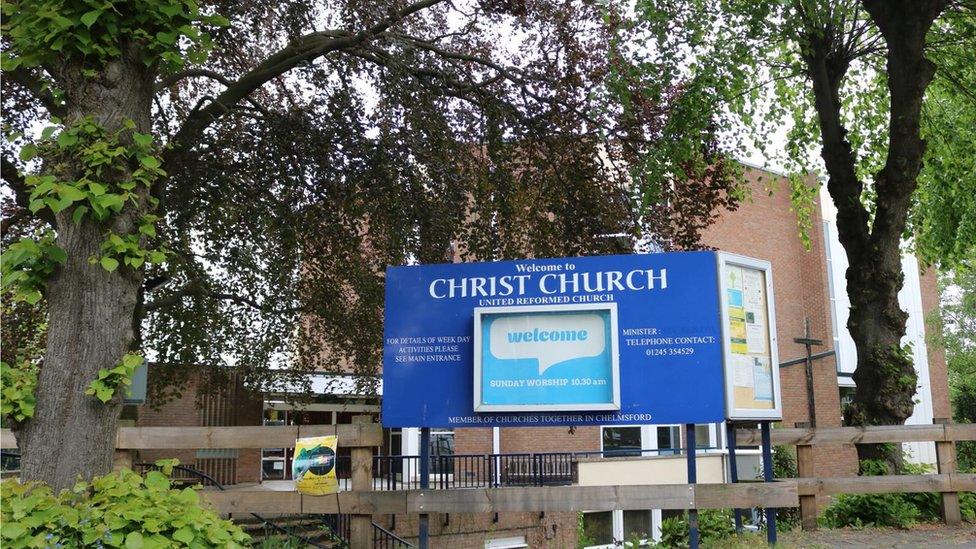
Ron Cousins regularly attended Christ Church, Chelmsford, among other places of worship
Still hoping for answers is the Reverend Geoffrey Roper, a former minister at Christchurch United Reformed Church, where Ron was a regular.
He described the murder as "so bizarre" and "so sick".
"The person who did it must have had a very disturbed relationship with God, with religion, with faith.
"In some ways it's sad and disturbing to bring these things up again, but it's right to keep a case open.
"And it's right that people should know murder will out."
To hear more about the Ron Cousins case, visit BBC Essex.